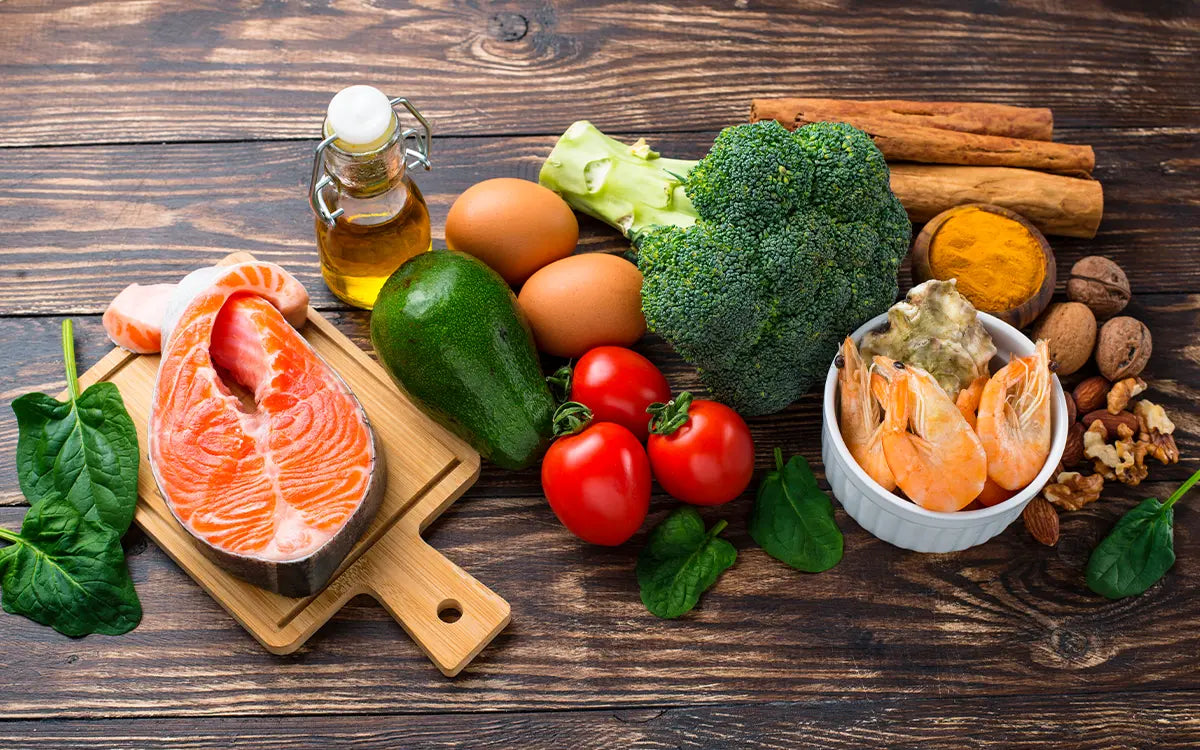Want to know how food affects your brain? Well, look no further. Here we dive into how our diet directly impacts our cognitive function.
Eating food is a big part of our day—but we don’t exactly know how the things we consume contribute to how our brain functions. But, it does—and it’s important.
Knowing how our diet impacts our cognitive function will empower you to make informed decisions about the foods you choose to eat.
If you want a simple, no-nonsense explanation on how the food we eat can impact your brain health, you’re in the right place.
Are you ready? Let’s go.
What is cognitive function?
Cognitive function refers to the mental processes and abilities that allow people to acquire, process, store, retrieve, and use information.
It involves key parts of thinking, reasoning, memory, perception, attention, language, and problem-solving.
Studies reveal that cognitive function (3) is crucial for everyday activities, learning, decision-making, and overall mental wellbeing.
The key components of cognitive function…
- Short-term memory: The ability to temporarily hold information for a short period.
- Long-term memory: The capacity to store and retrieve information over an extended period.
- Attention: The ability to focus on specific stimuli while filtering out distractions.
- Language: The capacity to understand, use, and communicate through spoken and written language.
- Executive function: The cognitive processes that involve planning, organising, initiating, and monitoring goal-directed activities.
- Perception: The interpretation and processing of sensory information from the environment, including visual, auditory, and tactile (touch-based) stimuli.
- Reasoning and problem-solving: The ability to think logically, analyse situations, and develop solutions to problems.
- Decision-making: The process of choosing between alternatives based on evaluation and judgement.
- Processing speed: The speed at which you can perform cognitive tasks like reading, solving problems, or responding to the world around you.
- Learning: The ability to acquire new knowledge and skills through experience or instruction.
To put it simply, the way our brain functions on a cognitive level is not a single, uniform ability.
But rather, a collection of interrelated processes (1) that work together to support mental activities.
It’s important to note that various factors, including genetics, age, health, lifestyle, and environmental influences, can impact the way our cognitive brain functions.

How does food affect your brain?
Food plays a crucial role in influencing the structure and function of the brain. The nutrients we get from our diet provide the building blocks for brain cells.
They contribute to the production of neurotransmitters and influence various processes that impact our mental function.
Here are some ways food impacts our brain…
Good diet
Good foods and a healthy diet are vital for our overall health—and, more specifically, brain function.
Essential nutrients, including vitamins, minerals, proteins, and fats, play a major role for the proper development and function of brain cells.
For example, omega-3 fatty acids are crucial for the formation of cell membranes in the brain.
Neurotransmitter production
Studies show that what we eat can impact our neurotransmitter production, which are chemical messengers that transmit signals (2) between nerve cells.
Amino acids obtained from proteins in the diet are used to produce neurotransmitters. For instance, the amino acid tryptophan is a precursor to serotonin—a neurotransmitter that regulates mood.
Blood flow, oxygen, and energy
Certain foods can influence blood flow and oxygenation in the brain. For example, foods rich in antioxidants (e.g. fruits and vegetables) may help protect blood vessels, improving blood flow to the brain.
Anti-inflammatory effects
Chronic inflammation has been linked to various neurological conditions. Some foods, such as those rich in omega-3 fatty acids and antioxidants, have anti-inflammatory properties that may help protect the brain.
Gut-brain connection
The gut and brain are interconnected, and the gut microbiome plays a role in influencing brain health.
Probiotics and a diet rich in fibre can promote a healthy gut microbiome, which may positively impact the way our brain functions and our mood.
Neuroplasticity
Neuroplasticity refers to the brain's ability to adapt and change over time. Certain nutrients, such as those found in fruits, vegetables, and whole grains, may support neuroplasticity and enhance learning and memory.
Neuroprotective effects
Some compounds in certain foods have neuroprotective properties. For example, antioxidants like flavonoids found in berries and dark chocolate may help protect the brain from oxidative stress.
An overall healthy dietary pattern, rather than individual nutrients, is crucial for brain health.

How can you improve cognitive function?
Improving cognitive function involves adopting a holistic approach that addresses various aspects of lifestyle, nutrition, and mental well-being.
Here are some strategies that may help enhance cognitive function…
Maintain a balanced diet
Include a variety of nutrient-dense foods in your diet, such as fruits, vegetables, whole grains, lean proteins, healthy fats and plant-based foods.
Ensure you’re eating foods with adequate omega-3 fatty acids, antioxidants, vitamins, and minerals. You can get these through a variety of different foods. More on that soon.
Stay hydrated
Proper hydration is essential for overall health, including brain function. Aim to drink enough water throughout the day to stay adequately hydrated.
Get regular exercise
Physical activity has been linked to improved cognitive function. Aim for at least 150 minutes of moderate-intensity aerobic exercise per week, along with strength training exercises.
Get enough sleep
Quality sleep is crucial for cognitive function, memory consolidation, and overall well-being. Aim for seven to nine hours of sleep per night and maintain a consistent sleep schedule.
Manage stress
Chronic stress can negatively impact the way our brain functions. Practice stress-reducing techniques such as mindfulness, meditation, deep breathing exercises, or yoga.
Mental stimulation
Engage in activities that challenge your brain, like puzzles, crosswords, chess, reading, or learning a new skill or language. Continuous mental stimulation can support cognitive health.
Socialise
Regular social interactions and maintaining strong social connections are associated with better cognitive function and a lower risk of cognitive decline.
Limit alcohol and avoid smoking
Excessive alcohol consumption and smoking can have negative effects on the brain. Limit alcohol intake and avoid smoking to support brain health.
Manage chronic health conditions
Effectively manage chronic conditions like diabetes, hypertension, and cardiovascular disease, as these conditions can impact cognitive function.
Stay mentally active as you age
As you age, continue to stay mentally active and engaged. Participate in activities that challenge your cognitive abilities to help maintain good brain function.
Try brain foods
Include foods rich in omega-3 fatty acids, antioxidants, and other brain-boosting nutrients (4) in your diet.
Good brain-boosting examples include fatty fish, berries, dark chocolate, nuts, and leafy green vegetables.
Stay informed and keep learning
Stay curious and engaged with the world. Learning new things, whether through reading, taking courses, or pursuing hobbies, can stimulate your mind and contribute to cognitive health.
Limit screen time
Excessive screen time, especially with electronic devices, may have negative effects on our brain's functions. Take breaks, and establish screen-free periods.

What are the best foods for a healthy brain?
A well-balanced diet that includes a variety of nutrient-rich foods is generally considered beneficial for brain health.
While no single food can provide all the necessary nutrients, adding a diverse range of foods to your diet can support the overall functioning of our cognitive brains.
Brain-boosting food examples…
Fatty Fish
Rich in omega-3 fatty acids, especially DHA (docosahexaenoic acid), fatty fish like salmon, trout, and sardines are crucial for brain health.
Omega-3s play a key role in the structure and function of brain cell membranes.
Blueberries
Packed with antioxidants, particularly flavonoids, blueberries may have neuroprotective effects and help improve cognitive function.
Broccoli
High in antioxidants and vitamin K, broccoli supports healthy brain function.
Pumpkin Seeds
A rich source of magnesium, iron, zinc, copper, and other minerals, pumpkin seeds provide nutrients that support brain health.
Dark Chocolate
Dark chocolate contains flavonoids, caffeine, and antioxidants, which can enhance memory and improve mood. But, moderation is key because of its big calorie content.
Nuts
Nuts like walnuts, almonds, and hazelnuts are rich in omega-3 fatty acids, antioxidants, vitamin E, and other nutrients that support brain development.
Oranges
High in vitamin C, oranges are antioxidants that may help prevent oxidative stress in the brain.
Eggs
Eggs are a good source of several nutrients, including choline (a precursor to acetylcholine, a neurotransmitter), vitamin B12, and selenium.
Turmeric
Curcumin, the active compound in turmeric, has anti-inflammatory and antioxidant benefits that may support brain health—improving memory and mood.
Whole Grains
Foods like whole grains (oats, quinoa, brown rice) provide a steady supply of energy to the brain through complex carbohydrates.
Avocados
They are rich in monounsaturated fats, which contribute to healthy blood flow. They also contain potassium, vitamin K, and folate.
Green Leafy Vegetables
Vegetables like kale, spinach, and collard greens are high in vitamins and antioxidants, promoting a healthy brain.
Berries
In addition to blueberries, other berries like strawberries and raspberries are rich in antioxidants and vitamins that may benefit cognitive function.
SmartTip: Avoid processed food that removes natural ingredients and lowers nutritional value. This includes added sugar, salt, preservative chemicals and saturated fat.
Meet Smart Protein’s Focus Kit
Are you struggling to stay focused and dealing with brain fog? We’ve got you covered with The Focus Kit which can help to sharpen your mind and concentration. Our products can fuel your focus and enhance mental clarity.
The bundle includes super greens, which help with vitality, a nootropic for concentration, and gummies for relaxation—the perfect concoction for focus.
The kit is your perfect companion for handling the pressures of life and getting the most out of your days.
SOURCES
Smart Protein is committed to sourcing only the best and scientifically-backed research in our articles.
1. Springer
https://link.springer.com/referenceworkentry/10.1007/978-94-007-0753-5_426
2. Oregon State University
https://lpi.oregonstate.edu/mic/health-disease/cognitive-function-in-brief
3. ncbi
https://www.ncbi.nlm.nih.gov/books/NBK559052/
4. BBC Good Food
https://www.bbcgoodfood.com/howto/guide/10-foods-boost-your-brainpower
5. Healthline
https://www.healthline.com/nutrition/11-brain-foods